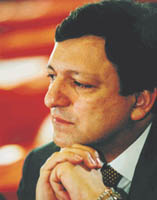Who is Durao Barroso?
 Biography of the new President of the European Commission
Biography of the new President of the European Commission

Jose Manuel Durao Barroso was born in Lisbon on 23rd March, 1956. He soon became involved in political activity, joining the MRPP (Reorganising Movement of the Proletarian Party), a Maoist organization, before the Revolution of 25th April 1974, which brought an end to the Fascist regime of Marcelo Caetano (who had succeeded Dr. Antonio Salazar in 1970).
His passage through Lisbon University's faculty of Law was marked by the now-famous fights between left-and right-wing political groups, in which Jose Barroso was a central figure. He abandoned his party in 1977 after it changed its name to PCTP-MRPP, adding “Portuguese Communist Workers’ Party), one year before he graduated and went to Geneva to take a Master’s Degree in Political and Social Sciences and later, specialization courses in Georgetown University, Washington. Returning to Portugal, he became a Teacher at his Law Faculty in Lisbon.
He joined the PSD (Social Democratic Party), centre-right, in 1980, becoming associated with the right-wing spectrum of the party, led by Anibal Cavaco Silva, who became leader of the PSD in May, 1985. In the general election held in October of that year, Jose Barroso was elected a Member of Parliament at 29 years of age, becoming Sub-Secretary of State in the Internal Affairs Ministry.
In 1987, alter a new election and the PSD gaining an absolute majority, Barroso was appointed Secretary of State for Cooperation in the Portuguese Foreign Ministry, involving himself in the beginning of the peace process in Angola (where the MPLA and UNITA had fought a civil war since 1975.
In 1992, after Cavaco Silva’s PSD was reelected with another absolute majority, Jose Barroso became the Minister of Foreign Affairs. He continued to work on the Angolan peace process, his work being rewarded with the signing of the Bicesse Agreement (1991) which temporarily halted the conflict. His period in government finished in 1995, when the PSD lost the election to the PS (Socialist Party), led by Antonio Guterres.
In opposition, Barroso continued to work in his chosen area, leading the Parliamentary Commission on Foreign Affairs and working as Director of the International Relations department at the Lusiada University, Lisbon, contributing towards the East Timor independence process.
In 1999, Barroso took advantage of an internal power struggle in his party (after the previous leader Marcelo Rebelo de Sousa was forced to resign after a disastrous alliance with the Popular Party of Paulo Portas). Candidate for the party leadership for the second time (after having lost the first battle to Fernando Nogueira in 1995), Jose Barroso was elected leader of the PSD.
As leader of the party, Jose Barroso was unable to make any inroads, due to his weak oratoricalskills and lackluster personality. The PSD lost the European Parliament elections in 1999 (31.1%, against the Socialists’ 43%), the legislative elections in Portugal the same year (32,3%) and the Presidential Election in 2001, where his candidate Joaquim Amaral was beaten by Dr. Jorge Sampaio (Socialist Party). However, Barroso was re-elected as party leader in 2000.
In December 2001, the Socialist party lost the main municipalities in the local elections (Lisbon, Coimbra, Oporto, Cascais and Sintra), although the party still had more votes than any other. Antonio Guterres, tired of the in-fighting in domestic politics, took this as a sign of his unpopularity and walked out of the government, leaving Eduardo Rodrigues as his substitute as leader of the party and calling for a parliamentary election.
During the election campaign, Barroso adopted a discourse of catastrophe, saying phrases like “The country is stripped naked” “Portugal is in chaos” “The country cannot continue like this”, which just about won him the election in 2002 (slightly ahead of the PS with 40.1% against 37.8% but needing to form an alliance with the former pariah, Paulo Portas (Popular Party, Conservative).
However, he failed to communicate with the people in his brief tenure of office, making him arguably the worst Prime Minister in recent political history, due to the fact that in two years, the unemployment rate doubled and unemployed people had to wait up to seven months for their state payments. He and his team, seen as inhumane and uncaring by the majority of the Portuguese, were extremely unpopular, a feeling reflected in the recent European Parliament elections, in which the government coalition was crushed by the Socialists.
As usual, Barroso acts as a protagonist and not as a man of integrity, accepting the European Commission as the third or fourth choice, just because there was nobody else. As a young man, he abandoned the left because he saw a chance with the right, allied himself to the man he thought would bring him the best chance of public office in his party, allied himself to the man (Portas, PP) who had attacked his party so vigorously in opposition in the 1990s (as Director of a national newspaper), criticized Antonio Guterres for abandoning the government half-way through his programme and then did exactly the same because he saw how unpopular he was.
It is a question of time before Jose Barroso commits an enormous gaffe in Europe, making as much a spectacle of himself (for the wrong reasons) abroad as he has done at home for the last two years, having arrived at his level of incompetence under Peter’s Principle.
Weak, uncharismatic, with zero communication skills, Jose Barroso would be better and happier working as a grey Eurocrat behind the scenes in the External Affairs area.
Subscribe to Pravda.Ru Telegram channel, Facebook, RSS!


